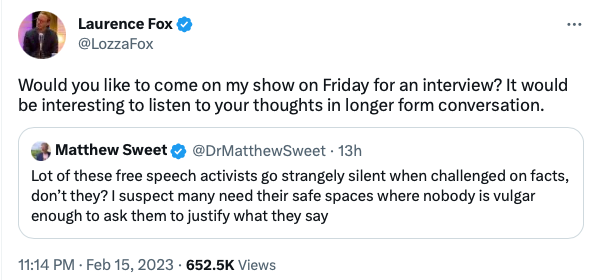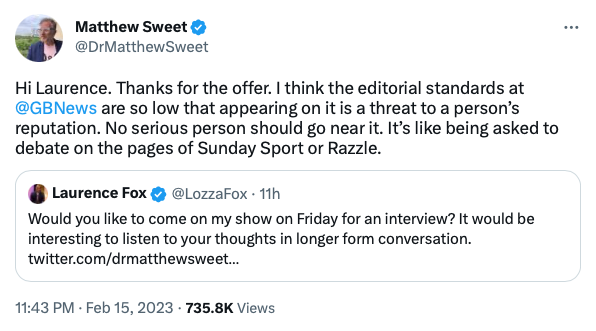The most damaging paper of the pandemic has just been published in The Lancet and it makes stunning reading.
|
|||||
Youth smoking has increased six-fold in Australia since 2019 despite the highest cigarette taxes in the world. That is what is shown by the orange line on the graph in Snowdon’s tweet. The graph is taken from page 8 of the Australian government’s own publication, “Current vaping and current smoking in the Australian population aged 14+ years: February 2018-March 2023”. If you seek to understand why this has happened, cross out “despite” and replace it with “because”. In an article called “Introducing the Snowdon Curve”, Tim Worstall explains further:
[…]
This first-person account by Jim Newell of Slate is being widely quoted: “A Brief, Concerning Conversation With Dianne Feinstein”
Senator Feinstein, who is 89, appears to have forgotten that she was in hospital with shingles for two and a half months. The left wing journalist Mehdi Hasan tweets,
He is right, but Feinstein’s is not the only photograph that could be placed below that downward-pointing finger. ‘Government insulation scheme ruined my home’ is the headline of this BBC piece about a man who says his flat has been ruined by black mould caused by a government “green” insulation scheme. The words “insulation” and “home” could be replaced by many other words and the headline would still hold. Although the piece describes Blaan Paterson as a “homeowner”, it seems from the text that his ex-council flat is still under the control of South Lanarkshire Council to some extent. He insists he was signed up to the Universal Home Insulation Scheme (UHIS) in 2011 without his consent. Things done by governments to people without their consent often turn out badly. Things done by governments for people who grab them with both hands under the impression that they are getting a free benefit often turn out badly, too. “Don’t look a gift horse in the mouth”, goes the proverb. Buyers have an incentive to think carefully about whether a proposed purchase is wise before they commit their money. Recipients of free stuff don’t. The incentives on government contractors not to think about whether insulation is right for a particular property are also strong.
The first few dozen grownup books I read were an odd selection. As I sampled them almost at random from my parents’ bookshelves, I became dimly aware that my parents were different people from each other, were different from what they had once been, and read books by people with whom they disagreed. Alongside the works by G K Chesterton and C S Lewis one would expect on the shelves of liberal British Catholics of the 1970s, I found such things as a book of essays by the Stalinist physicist J D Bernal – and a copy of Ideology and Insanity by Thomas Szasz. Attracted by the strangeness to my young eyes of the name “Szasz” and the wonderful cover art of the Penguin edition that depicted two men playing chess across a Escher-like dimensional warp, I gave it a go. Almost a decade before I heard the term “Libertarian”, I thus had my first introduction to an important strand of libertarian thought. Until the copy of that same 1970 Penguin edition I just ordered on eBay arrives, I shall have to go by memory and Szasz’s Wikipedia biography as to exactly what the book said, but I do remember being thrilled to feel my perspective suddenly widen, in a manner akin to what I had felt when I realised that the Earth was but one of an infinite number of possible vantage points in the universe.
And
Great stuff. I think Szasz still has much to teach us… but I suppose by now you have all heard of the killing of Jordan Neely on a New York subway train? → Continue reading: Ideology and Insanity on the New York subway The United States Surgeon-General, Dr. Vivek Murthy, has issued an advisory on America’s epidemic of loneliness and isolation. The report says that loneliness poses health risks as deadly as smoking. I do not make this post only to say the obvious “Gotcha”. In fact Dr Murthy’s document is more honest than I expected in acknowledging that the Coronavirus lockdown increased social isolation among all age groups. By saying that isolation is more deadly than smoking (the big medical bête noire before and after that slot was taken by Covid-19), the document implicitly admits that the Covid “cure” may have been worse than the disease. I would cut the medical establishment a lot more slack about lockdowns if they had been this honest about the inevitable tradeoffs at the time. Loneliness lies like a black cloud over modern Western societies. Of course this is, literally, a First World problem: people struggling to survive do not have time or energy to feel lonely. But the fact that others suffer from more desperate evils does not make this one minor. We do need to think about it. Unfortunately the Surgeon General’s document is written entirely within a statist paradigm. Chapter 4 has the title “A National Strategy to Advance Social Connection”. It recommends “Six Pillars to Advance Social Connection.” The six pillars are 1. Strengthen Social Infrastructure in Local Communities If you want to see what Dr Murthy thinks these goals should involve, look at the graphic on page 47. All of them are driven by the state, including the innocent-sounding “Deepen Our Knowledge”. He hopes to build a culture of voluntary connection between individuals by decree. And lo, there be pestilence in the land. And the King didst decree that all should partake of the magic potion. And then Andrew of Bridgen didst say, “All my followers are dying!” And the gods of Tory didst smite him. And then John of Campbell didst say, “Funny. All my followers are dying!” I must make haste to Bridgen by means of fibre optic cable and parlay with him. And the gods of Google didst smite him. But the Lord had spoken to Tommy of Luton – that most unpromising of his servants – and said “taketh a recording of this YouTube and uploadeth it to Telegram so that my people might hear the word of Campbell and Bridgen.” And he did. And the Lord was pleased. Update: And the Lord did command that all his brethren didst install Telegram on their tablets of silicon that they might hear the word of Campbell and Bridgen. Update 2: the censored video of Dr. John Campbell interviewing Andrew Bridgen is also available on BitChute “Two men admit removing body parts in ‘eunuch maker’ case”, reports the Guardian.
Given that these people were all consenting adults, I do not understand why their actions (other than the theft of the anaesthetic) should be a criminal offence, particularly as surgical operations to remove people’s penises are legal in male to female sex change operations. Does it make a difference in principle whether the appearance aimed for when surgically removing a penis is female or eunuchoid? My question is not designed to provoke the reaction “Of course it should be legal to do this, just as it is legal to perform sex change operations”. Nor is it designed to provoke the reaction “Of course it should be illegal to perform sex change operations, just as it is illegal to do this.” I can see reasonable justification for saying that changing someone’s body to be like lots of other people’s bodies is much more likely to go well than changing their body to a form few others have. By “go well”, I mean be likely to increase the wellbeing of the person upon whom the operation is performed, or be less likely to decrease it, and also to go well in the same ways that any surgical operation is judged a success or a failure. Related earlier Samizdata posts: Discussion point: circumcision from October 2013. Discussion point: can children consent to puberty blockers? What about other drastic treatments? from October 2020. If you feel moved to comment, please seek neither to be offended nor to offend, and try not to get hung up by questions of terminology. This “Threadreader” page shows a now-deleted set of tweets by the Editor-in-Chief of Science magazine, Holden Thorp:
Emphasis added. Found via Stuart Ritchie. Why does everything have to be justified on the basis that it will help the NHS? Especially when the NHS is failing its patients so badly? UK healthcare spending as a percentage of GDP now ranks fifth highest in the OECD, yet the system isn’t delivering even the most basic forms of care. Some 2.7 million people are sitting anxiously on the waiting list. |
|||||

All content on this website (including text, photographs, audio files, and any other original works), unless otherwise noted, is licensed under a Creative Commons License. |
|||||





